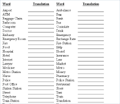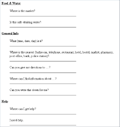Communication Info Sheets
Words To Know
 If you are studying or traveling in General, you learn some the language of the country of your choice. In the event of an emergency, you need to be able to communicate and understand effectively. You need to be able to ask for help if injured, and ask for legal protection if your rights are in jeopardy. If you have a specific health condition, a special need, or if you are allergic to any medication, know exactly how to say so in the language of the country of your choice. Regardless of your language proficiency level, there are a few basic words, phrases, and questions that you should be able to pronounce fluently. You should fill out our Words To Know Sheet and take it with you for reference.
If you are studying or traveling in General, you learn some the language of the country of your choice. In the event of an emergency, you need to be able to communicate and understand effectively. You need to be able to ask for help if injured, and ask for legal protection if your rights are in jeopardy. If you have a specific health condition, a special need, or if you are allergic to any medication, know exactly how to say so in the language of the country of your choice. Regardless of your language proficiency level, there are a few basic words, phrases, and questions that you should be able to pronounce fluently. You should fill out our Words To Know Sheet and take it with you for reference.
Phrases To Know
 Each student should develop his or her own personal list of essential words and phrases to know. You may encounter many other helpful and important phrases you would like to include on your own list. For instance, you may want to look up specific phrases pertaining to General. Use our list as a guide, or starting point; then add your own additional General–specific phrases. In addition, you should also know how to dial a country's 24–hour emergency phone number (equivalent to a 9–1–1 system).
Each student should develop his or her own personal list of essential words and phrases to know. You may encounter many other helpful and important phrases you would like to include on your own list. For instance, you may want to look up specific phrases pertaining to General. Use our list as a guide, or starting point; then add your own additional General–specific phrases. In addition, you should also know how to dial a country's 24–hour emergency phone number (equivalent to a 9–1–1 system).
Images To Know
![]() You may find it helpful to print and cut out our Service Icons Card that you can carry with you. The card contains a series of simple images that represent services you may require—services like a telephone, post–office, taxi, and hospital. If you don't remember, or don't know, how to say a certain word in the language of the country of your choice, you can point to the picture on the card that represents that word. For example, if you need to find a telephone, you can show someone the picture of a telephone on the card and they can assist you. It is better to already be able to comfortably communicate in the language of the country of your choice when studying in General. However, you should keep this card with you just in case you forget how to say a certain word, or, in the case of injury, you become physically unable to verbally communicate.
You may find it helpful to print and cut out our Service Icons Card that you can carry with you. The card contains a series of simple images that represent services you may require—services like a telephone, post–office, taxi, and hospital. If you don't remember, or don't know, how to say a certain word in the language of the country of your choice, you can point to the picture on the card that represents that word. For example, if you need to find a telephone, you can show someone the picture of a telephone on the card and they can assist you. It is better to already be able to comfortably communicate in the language of the country of your choice when studying in General. However, you should keep this card with you just in case you forget how to say a certain word, or, in the case of injury, you become physically unable to verbally communicate.




 Worldwide
Worldwide


